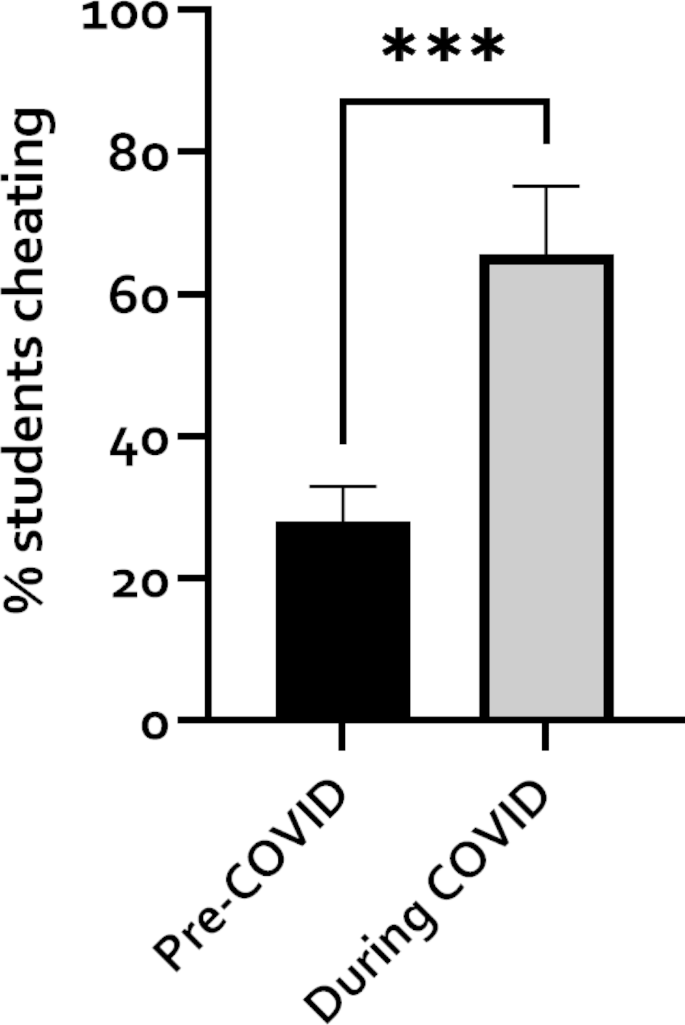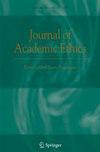在线考试作弊有多普遍,在COVID-19大流行期间是否有所增加?系统回顾
IF 3.3
Q1 ETHICS
引用次数: 3
摘要
学术不端行为对网络考试的有效性和可靠性构成了威胁。据媒体报道,在新冠肺炎疫情紧急转向网络考试期间,高等教育中的学术不端行为急剧增加。这项研究回顾了调查研究,以确定大学生承认在线考试作弊的普遍程度,以及他们是如何以及为什么这么做的。我们还评估了这些作弊的自我报告在COVID-19大流行期间是否有所增加,并评估了解决这些问题的研究证据的质量。从2012年开始的19项研究中确定了25个样本,包括4672名参与者。网上考试作弊是由相当少数(44.7%)的学生自我报告的。在COVID前,这一比例为29.9%,但在COVID作弊期间,这一比例跃升至54.7%,尽管这些样本更具异质性。个人作弊比集体作弊更常见,学生报告作弊的最常见原因仅仅是有机会这样做。远程监考似乎减少了作弊的发生,尽管数据有限。然而,有一些方法上的特点降低了对所有这些发现的准确性的信心。大多数样本的收集使用的设计使得在线考试作弊可能被低估,例如使用方便的抽样,适度的样本量和计算回答率的信息不足。没有研究考虑样本是否能代表他们的人口。考虑到有相当数量的学生似乎愿意承认参与不当行为,未来的在线考试方法应该考虑如何维持考试的基本有效性。未来对学术不端行为的研究将受益于使用大量代表性样本,保证参与者的匿名性。本文章由计算机程序翻译,如有差异,请以英文原文为准。

How Common is Cheating in Online Exams and did it Increase During the COVID-19 Pandemic? A Systematic Review
Abstract Academic misconduct is a threat to the validity and reliability of online examinations, and media reports suggest that misconduct spiked dramatically in higher education during the emergency shift to online exams caused by the COVID-19 pandemic. This study reviewed survey research to determine how common it is for university students to admit cheating in online exams, and how and why they do it. We also assessed whether these self-reports of cheating increased during the COVID-19 pandemic, along with an evaluation of the quality of the research evidence which addressed these questions. 25 samples were identified from 19 Studies, including 4672 participants, going back to 2012. Online exam cheating was self-reported by a substantial minority (44.7%) of students in total. Pre-COVID this was 29.9%, but during COVID cheating jumped to 54.7%, although these samples were more heterogenous. Individual cheating was more common than group cheating, and the most common reason students reported for cheating was simply that there was an opportunity to do so. Remote proctoring appeared to reduce the occurrence of cheating, although data were limited. However there were a number of methodological features which reduce confidence in the accuracy of all these findings. Most samples were collected using designs which makes it likely that online exam cheating is under-reported, for example using convenience sampling, a modest sample size and insufficient information to calculate response rate. No studies considered whether samples were representative of their population. Future approaches to online exams should consider how the basic validity of examinations can be maintained, considering the substantial numbers of students who appear to be willing to admit engaging in misconduct. Future research on academic misconduct would benefit from using large representative samples, guaranteeing participants anonymity.
求助全文
通过发布文献求助,成功后即可免费获取论文全文。
去求助
来源期刊

Journal of Academic Ethics
ETHICS-
CiteScore
4.70
自引率
5.60%
发文量
18
期刊介绍:
The Journal of Academic Ethics is a multidisciplinary and interdisciplinary, peer reviewed journal which examines all ethical issues which arise within the scope of university purposes. The journal publishes original research in the ethics of research production and publication; teaching and student relations; leadership; management and governance. The journal offers sustained inquiry into such topics as the ethics of university strategic directions; ethical investments; sustainability practices; the responsible conduct of research and teaching; collegiality and faculty relations; and the appropriate models of ethical and accountable governance for universities in the 21st century.
 求助内容:
求助内容: 应助结果提醒方式:
应助结果提醒方式:


